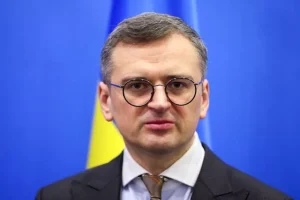Ukraine’s parliament has passed a law that will govern how the country recruits new conscripts, following months of delay and after thousands of amendments were submitted to water down the initial draft.
Lawmakers dragged their feet for months over the legislation, which is expected to be unpopular.
The law was spurred by a request from the military command under former army commander Valerii Zaluzhny, who said Ukraine was in need of up to 500,000 new recruits to boost army ranks.
Exhausted soldiers, on the front lines since Russia launched a full-scale invasion of Ukraine, had no means to rotate out for rest, while many thousands of Ukrainian men continue to evade the draft.

The law brings into effect a host of changes to the current system by expanding the powers of Ukrainian authorities to issue draft notices using an electronic system.
Incumbent army chief Oleksandr Syrskyi and Ukrainian president Volodymyr Zelensky have since revised the new recruits figure after conducting an audit, saying the number needed was not as high because soldiers could be rotated from the rear.
Mr Zaluzhny’s dismissal from post was reportedly over the mobilisation issue.
The vote came after parliament’s defence committee removed a key provision from the draft on Tuesday that would ensure the rotation of servicemen after 36 months of combat, a move that surprised some lawmakers as it had been a promise of the Ukrainian leadership.
Lawmaker Oleksii Honcharenko said in a Telegram post that he was shocked by the move to remove the provision. It was likely to have been taken out because, considering the scale and intensity of the war against Russia, it would prove difficult to implement.
Ukraine already suffers from a lack of trained recruits capable of fighting, and demobilising soldiers on the front lines now would deprive Ukrainian forces of their most capable fighters.
ADVERTISEMENT
On Wednesday, the parliamentary defence committee instructed the Defence Ministry to draft a comprehensive bill on demobilisation of military personnel within the next eight months, news reports cited ministry spokesperson Dmytro Lazutkin as saying.
In night-time missile and drone attacks, at least 10 of the strikes damaged energy infrastructure in Kharkiv, Ukraine’s second-largest city.
Ukrainian foreign minister Dmytro Kuleba said more than 200,000 people in the region were without power and that Russia was “trying to destroy Kharkiv’s infrastructure and leave the city in darkness”.
In the Odesa region, four people were killed and 14 injured in Russian missile strikes on Wednesday evening, regional governor Oleh Kiper said.
Energy facilities were also hit in the Zaporizhzhia and Lviv regions.
Discover more from London Glossy Post
Subscribe to get the latest posts sent to your email.


